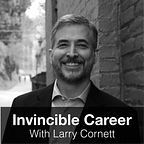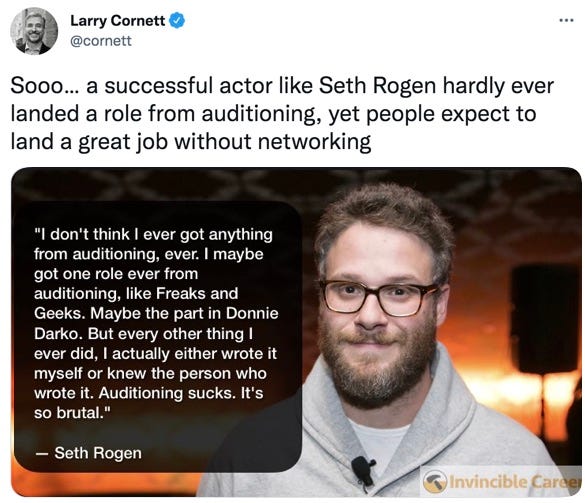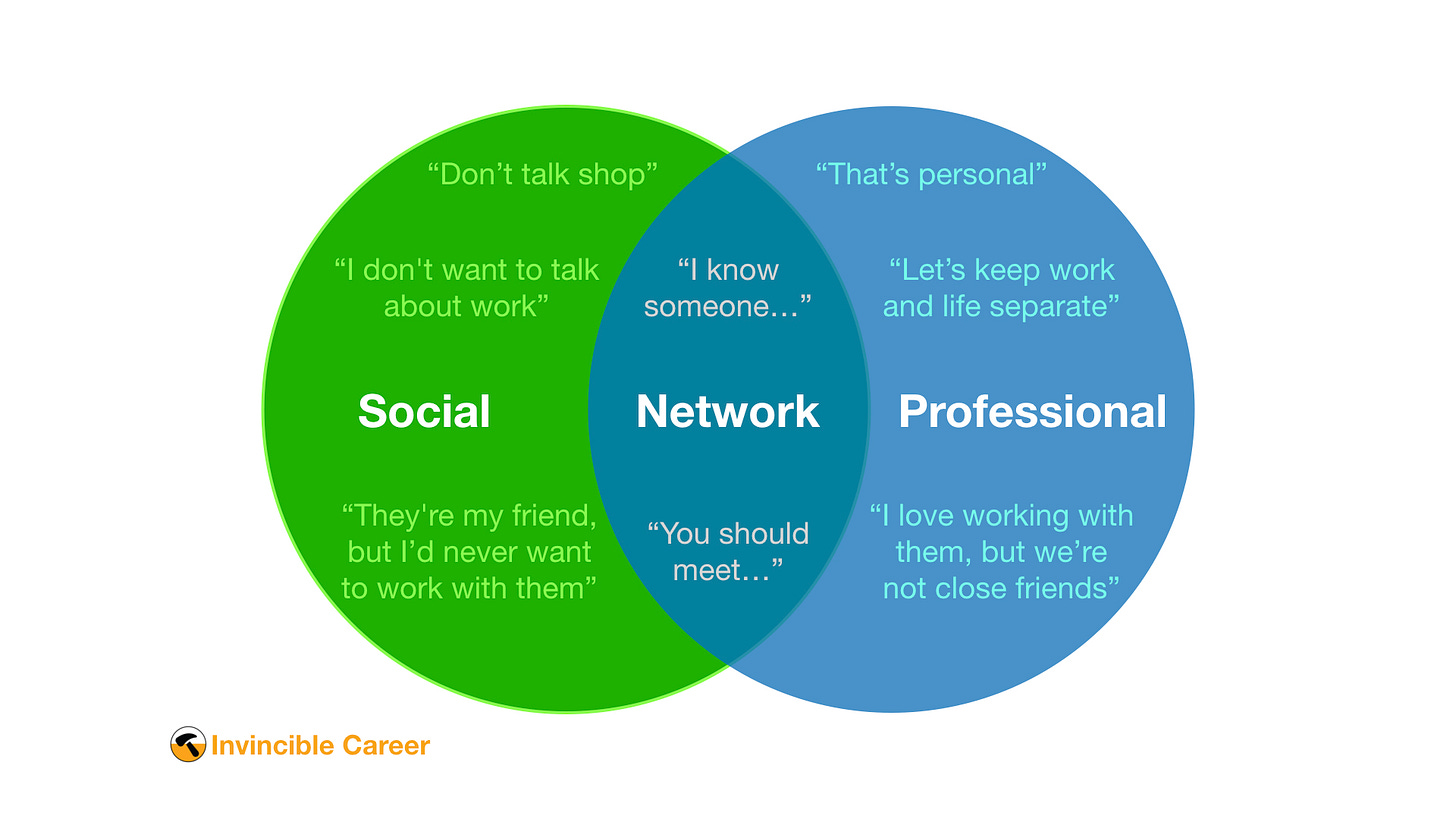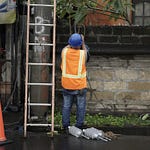
A few days ago, I tweeted a quote from Seth Rogen using something he said on the podcast “Dead Eyes.” It’s produced and hosted by Connor Ratliff and explores the time Tom Hanks fired him from the 2001 HBO mini-series, Band of Brothers. It’s pretty good. You should check it out.
I heard Seth talking about auditions and it made me think of the frustration people feel after dozens of failed job interviews. Here’s my tweet. Note the part where he said, “or knew the person who wrote it.”
I’m a fan of Seth’s work as a director, producer, and actor. I’ve enjoyed many of his movies, and his laugh always makes me laugh whenever I hear it. So, I was surprised and delighted when he actually took the time to respond.
Now, I didn’t actually say that he used “networking” to land his roles, but I guess it was implied. It became quite the polarizing discussion on Twitter! Some people supported me and my comment about networking in their follow-up tweets.
“I’d call that luck… 🤷🏽♂️💯 And networking… You forged relationships with dear friends who happen to all be famous af. That’s not reality for anyone. That’s pretty blessed and lucky imo.”
“That's networking Seth, you created the network”
“Hey Seth that’s networking”
“I’m pretty sure you just described networking.”
“F*%$ man, who am I to say but I think that might be networking”
“AKA “Networking”. Your awesome Dude, love all your work.”
“Social networking. No crime in it. Everyone succeeds.”
“So, networking…”
“I feel like that’s definitely networking, lol.”
“Soooooo… Networking 😂 🤣”
“Yep, that’s what he said….Networking 😂”
“Just btw Seth, creating relationships with other people in your industry is literally called networking 😂” (to which Seth replied, “I don’t think so.”)
Other people were more than happy to tell me how stupid I am. You have to grow a thick skin if you want engagement on Twitter. 🤣
“Yeah, LARRY”
“Seth said, ‘dont career-speak me into your shiz dude. you dont know me.’ King.”
"‘networking’ just feels so shallow. I get it, but I like your way better, Seth.”
“you tell em 👏”
“tear that a$$ up boo”
and a few more that I don’t think I should share… 🤣
Note: if you want to increase your engagement on Twitter, tweet a polarizing point of view. Bonus points if you can get a celebrity to respond.
There’s nothing wrong with smart networking
Networking isn't a dirty word. If you think it is, you're doing it the wrong way. People obviously have very different definitions of networking. They're envisioning very different things.
Unfortunately, many people have a negative view of networking. They picture the typical cocktail parties and industry events. They also have nasty things to say about people who network.
“When most people think of networking, they automatically have a vision in their head of cocktail parties and conventions. My approach to networking is based on a transformation process and not a transactional game.”
— Porter Gale, author of Your Network Is Your Net Worth: Unlock the Hidden Power of Connections for Wealth, Success, and Happiness in the Digital Age (my affiliate link)
Other people accept networking as part of their professional life. They know that it’s a useful way to meet new people in your industry, build new relationships, and find people you may enjoy working with later.
While I never had much luck with traditional networking events (e.g., industry mixers), I have met some wonderful people through more strategic networking activities. I have more success when I give a talk at an event, meet people for 1-on-1 conversations (e.g., Zoom coffee chats), or get introduced by a mutual friend.
Better approaches than shallow networking events include:
Creating your own network (what Seth has done).
Building relationships and inviting people into your network.
Tapping into your network for advice.
Leveraging your network for finding opportunities.
Feeding opportunities back into your network.
Forging new connections between people in your network (i.e., you know them, but they don't know each other).
Our networks increasingly overlap
I think we've all experienced a shift in our personal and professional lives over the past few years. Our attempt to maintain work-life separation and work-life balance has evolved into a work-life blend.
Perhaps I notice this more as a solopreneur, but my social circle and professional circle are overlapping more lately. I know that some of this is because of the pandemic and how much my social life and working life involve a lot of online chats and Zoom meetings.
Sure, we do still have purely social friendships and purely professional relationships. But there is an overlapping area with a hybrid network that lives in both worlds.
We refer friends for jobs.
We introduce professional friends and acquaintances who we think would benefit from meeting each other.
We connect people who can help each other.
We sometimes form working partnerships with old friends and talented people from previous jobs.
Networking doesn’t just happen at those massive industry events or professional cocktail parties. That’s a very limiting view of the activity.
Networking occurs whenever a friend tells you they’re hiring for a new role in their company and you say, “Hey, I know someone who might be a good fit.” It occurs whenever you’re talking with a friend who is struggling with an issue and you say, “You should meet my friend. She has a service that addresses that problem.”
Seth gets value out of his network
I also think what Seth was trying to say is that his personal network was a side effect of great working relationships and friendships with talented people. He wasn't intentionally trying to "network" first (i.e., the verb), and perhaps he does hate the act of “networking.”
Where I went wrong with my tweet — which resulted in such a negative visceral reaction from many — is my use of the word “networking” instead of talking about social and professional “networks.” I doubt that so many people would have disagreed with my tweet had I worded it this way:
“Sooo… a successful actor like Seth Rogen hardly ever landed a role from auditioning, yet people expect to land a great job without tapping into their network.”
I would hope Seth wouldn’t deny that the power of his network did indeed help him during the earlier years of his career. Later, in the same podcast episode, Adam McKay (director of “Anchorman”) shared a story about Judd Apatow:
"Judd had done Freaks and Geeks with Seth and came to me and was like, ‘Hey, do you mind if we give this guy a line? Uh, he's really funny. I think he's really talented.’ And that was it. We put him in, and... He had like, the tiniest moment, but he did that really funny countdown, with the pinky move. So even in that tiny little moment, he made it work. But yeah, that was it. It was Judd. Judd was like, ‘Please cast this guy.’ And it was like, ‘Okay!’ And he was great.”
Investopedia has this definition of networking:
”Networking is the exchange of information and ideas among people with a common profession or special interest, usually in an informal social setting. Networking often begins with a single point of common ground. Professionals use networking to expand their circles of acquaintances, find out about job opportunities in their fields, and increase their awareness of news and trends in their fields or the greater world.”
Well, Judd telling Adam that Seth was really funny and talented and that they should cast him was definitely an exchange of useful information.
Call me crazy, but it’s an example of powerful networking. Seth wasn’t the producer or director of “Anchorman.” He didn’t create that role for himself. Judd was connected to both Seth and Adam (you might say they were networked together 😉) and he’s the one that made it happen.
Networking the right way
I found this response amusing. Apparently, Emily doesn’t want to work with you if you use the word “networking.”
What would you prefer to call those events when you socialize with other professionals? I don't know about you, but I can find better uses for my time than attending some professional event and trying to think of it as pure fun or socializing. It is indeed a hybrid event.
I guess I have more enjoyable ways to have real fun. You know, like hanging out with friends and family. I don't refer to my time socializing with friends and family as "networking." But, if I am forced to attend some professional event (e.g., a conference after-party), yes, that's "networking."
Perhaps it isn't the smarmy, shallow, schmoozing networking that this person is used to experiencing. But, for me, it is the lighter, more enjoyable, and more authentic professional networking that I can find somewhat enjoyable.
It's still not my first choice for connecting with people. I'd prefer a more intimate dinner with a few people from an event. But, I can make it more tolerable with the tips I've provided before in this article.
I'm also going to call BS on the suggestion that going to professional social events should be all about fun and friendships. Are you trying to tell me that every person you have a positive working relationship with is also a dear friend that you invite to your inner circle of friends, Thanksgiving dinners, and your most intimate gatherings? I don’t buy it.
Mature adults realize and accept that we have different levels of intimacy, relationships, and friendships. We can respect and admire people without being "friends." We can be friendly with people in a professional relationship without assuming that we're best buddies.
Of course, real personal friendships can and do occur with work colleagues. No one denies that. Some working relationships transform into personal friendships. But not all work relationships are equivalent to friendships.
The process of building and maintaining professional relationships is different from nurturing personal friendships. They are not the same. It's foolish to get on your high horse and proclaim that they should be the same.
Whether people like it or not, a powerful network will help you get ahead in your career. Very few people are born into families that immediately give them access to a network that will help them succeed in life (e.g., Kennedy, Windsor, House of Saud, Rockefeller, Ambani, Rothschild).
Most of us will need to build and nurture our own networks and, yes, the actions we take to do so will fall under the umbrella of networking.
By the way, there is a great way you can support my work without spending any money on a premium subscription:
📣 Recommending my newsletter on social media! 📣
It only takes a few seconds, and it helps grow my business so I can continue making time to write it.
I’ll even provide some copy and paste text to make it easy to share on Twitter, Reddit, LinkedIn, Facebook, etc. Thanks in advance!
I've really been enjoying the Invincible Career newsletter by Larry Cornett (@cornett). If you want to get ahead at work and be happier in your job, but you aren’t subscribed yet, you’re missing out.
https://newsletter.invinciblecareer.com
Larry Cornett is a leadership coach and business advisor who hosts a private mastermind community for ambitious professionals with weekly challenges, office hours, and confidential support. If you’re interested in starting your own business or side hustle someday (or accelerating an existing one), check out his “Employee to Solopreneur” course (launching later this year).
Larry lives in Northern California near Lake Tahoe with his wife and children, and a gigantic Great Dane. He does his best to share advice to help others take complete control of their work and life. He’s also on Twitter @cornett.



















